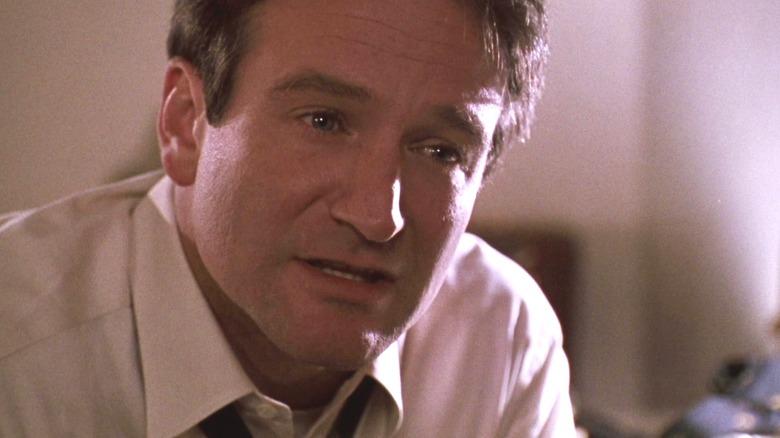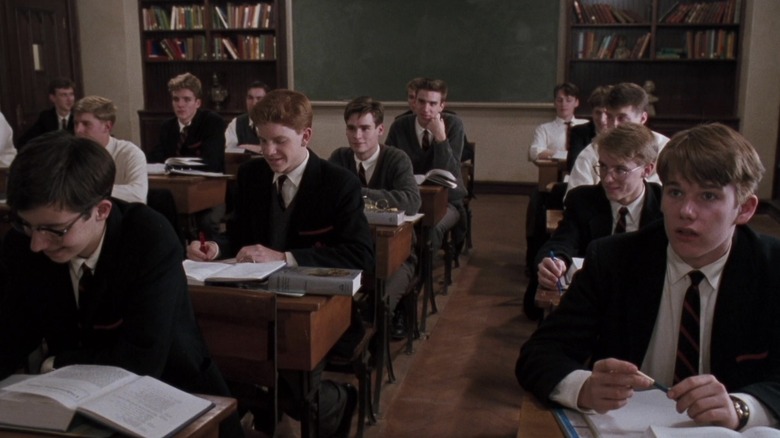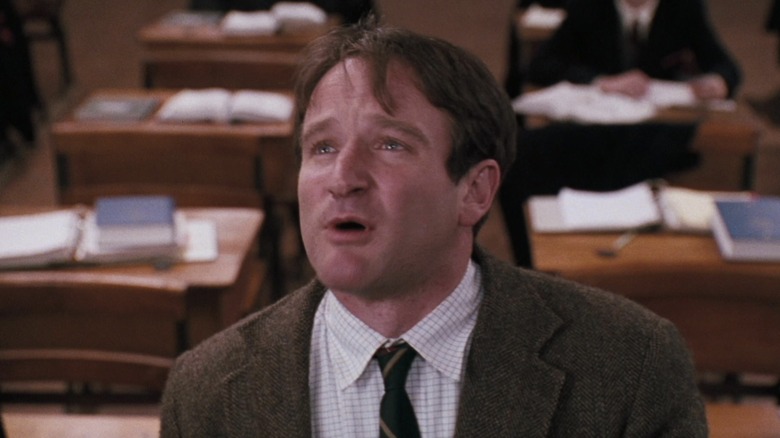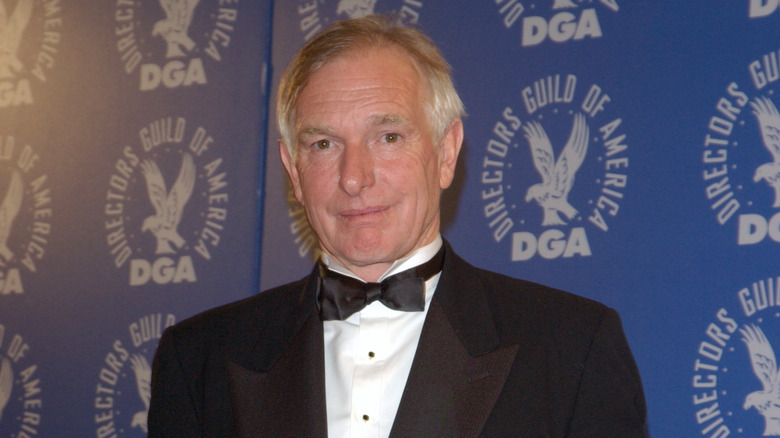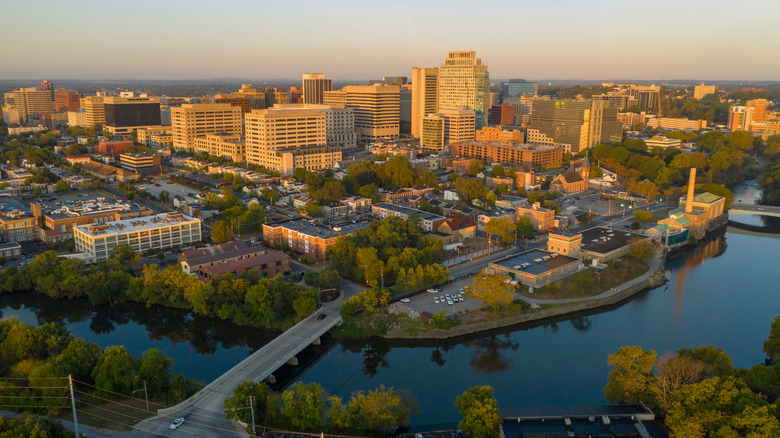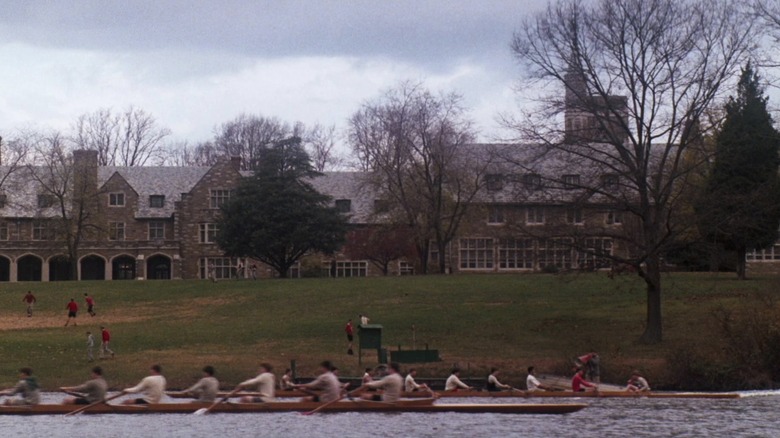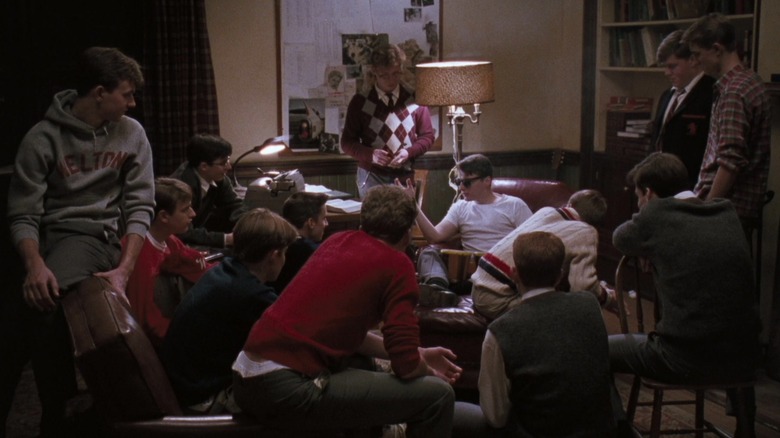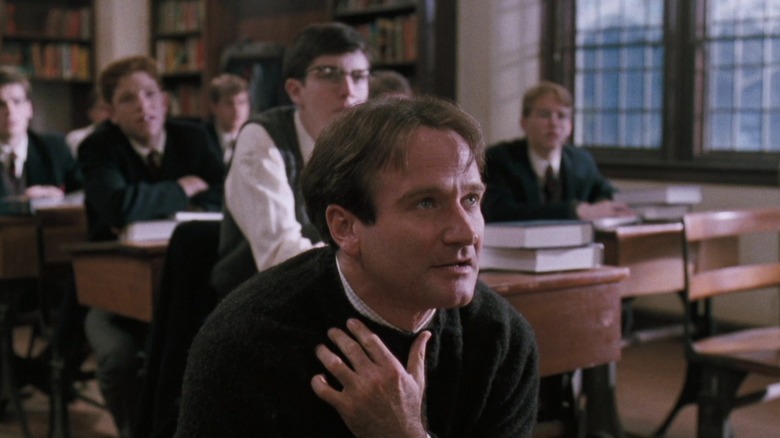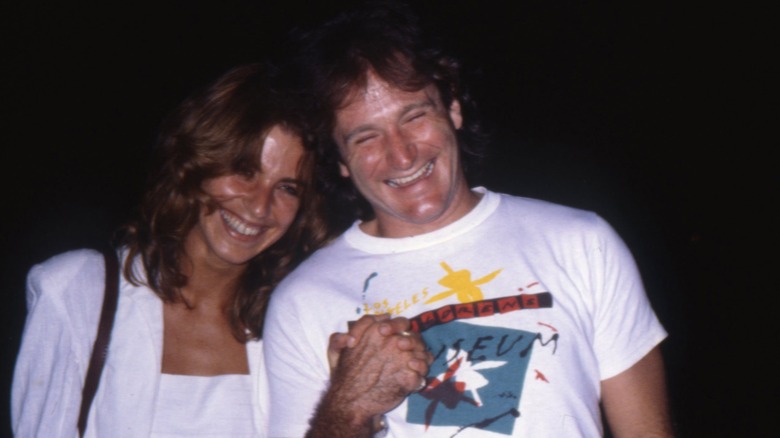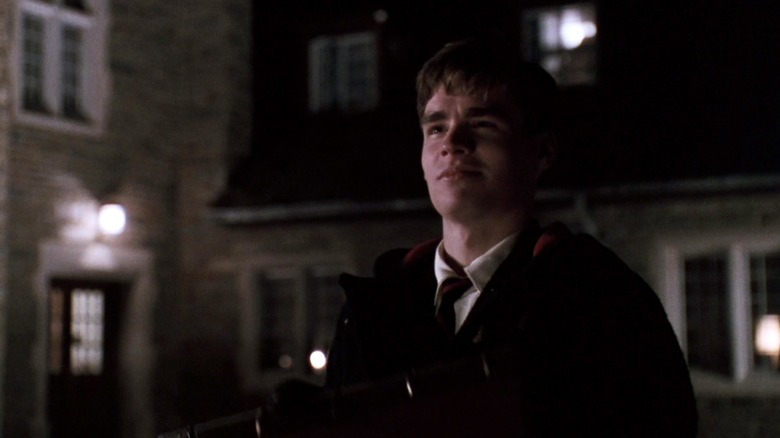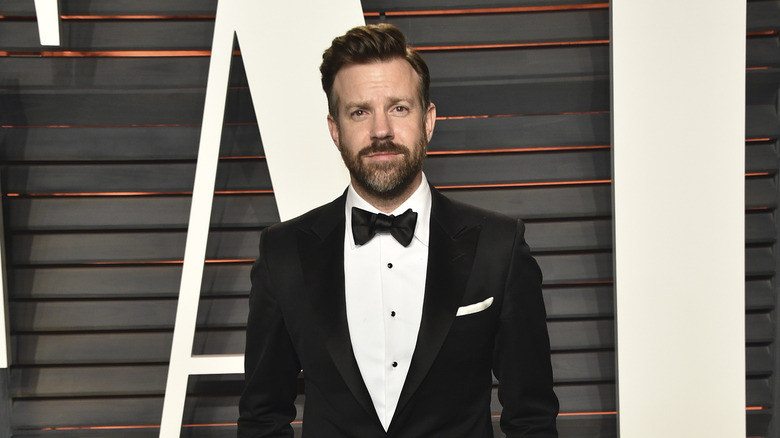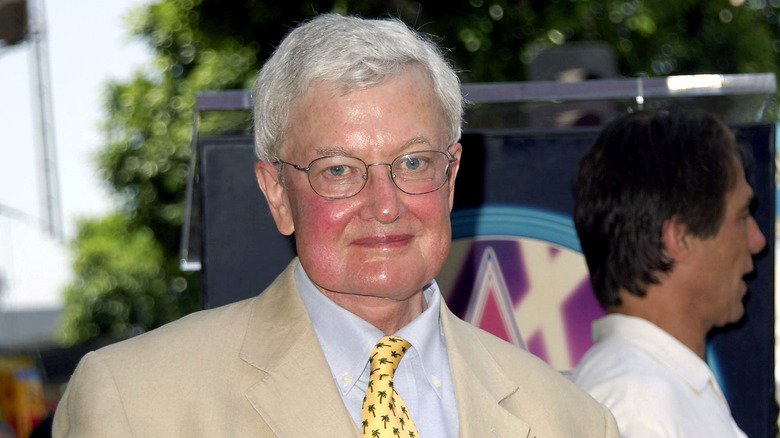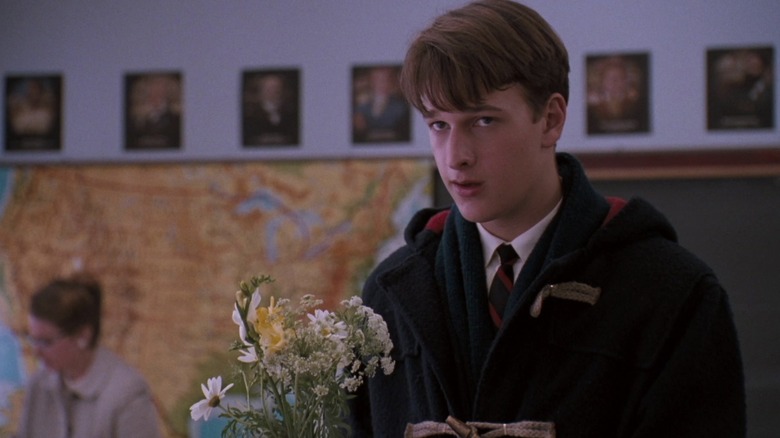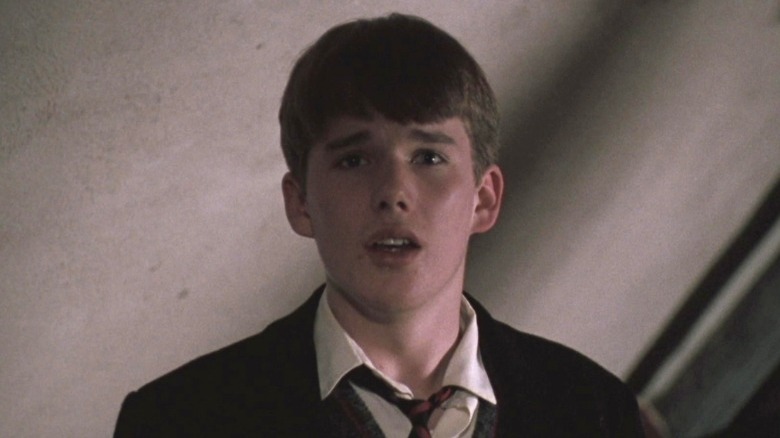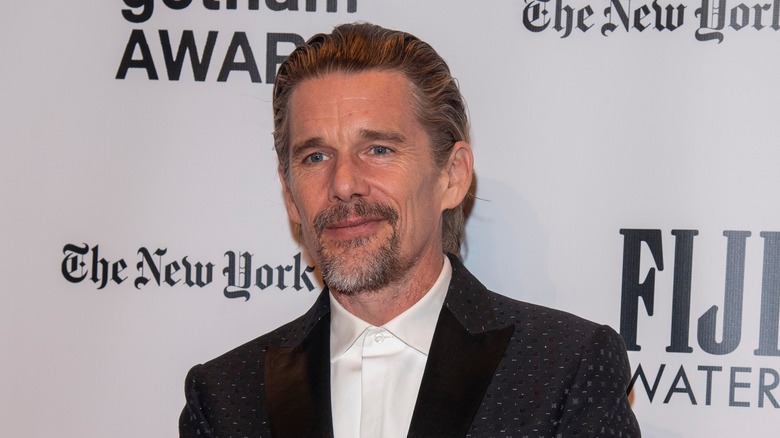The Untold Truth Of Dead Poets Society
After a tough start, "Dead Poets Society" was a surprise hit for Disney, becoming a critical and commercial success (via The Numbers). It was the first Touchstone Pictures film to be nominated for an Oscar in the best picture category (per Moviefone).
This coming-of-age film is about a group of students at Vermont's all-boys prep school, Welton Academy, in 1959. In the film, these young men are inspired to revive a defunct secret society by their enthusiastic English teacher, John Keating, played by the talented Robin Williams. Keating was a founding member of the Dead Poets Society when he was a student at Welton. Keating also inspires these boys to think for themselves, and "suck the marrow out of life," by finding their passion for life, poetry, and the arts.
Although this film is a work of fiction, it takes inspiration from the life of the screenwriter Tom Schulman, who won an Oscar for his screenplay (via IMDb). Join us as we uncover the untold truth of "Dead Poets Society."
Welton Academy is fictional
The fictional Welton Academy is in Vermont, but Welton was based upon screenwriter Tom Schulman's experience attending Montgomery Bell Academy in Nashville, Tennessee (via Montgomery Bell Academy). The film is loosely based on Schulman's life, and the characters resembled people from his life. In an interview with the University of California Television, Schulman said Knox Overstreet (Josh Charles) was based on a friend from college who was over-the-moon in love with a girl named Chris.
In an interview between Schulman and Montgomery Bell Academy's Headmaster, Schulman spoke about how he was working on a script inspired by his acting and writing class in Los Angeles, explaining how after he switched to the setting of a boys' school, his story came into focus. Schulman realized the story wasn't just about an inspiring teacher, but about how this teacher helped transform the lives of his students.
Schulman's alma mater, Montgomery Bell Academy, was founded in 1867 and is the only boys' school in the Nashville area. Even now, in the 21st century, we can see the emphasis on history and tradition of the fictional Welton Academy echoed in MBA's mission of developing their students into, "Gentlemen, Scholars, Athletes" (via Montgomery Bell Academy). Although MBA is a day school rather than a boarding school, the inspiration Schulman took from his alma mater is clear.
John Keating was based upon Schulman's professors
As Tom Schulman revealed in an interview with Montgomery Bell Academy, he first began working on the script that evolved into "Dead Poets Society" while attending the Actors and Directors Lab in Los Angeles. His teacher's mentor, Harold Clurman, who would visit to advise the students before launching into rousing speeches, inspired Schulman. Schulman felt his script lacked something essential, and set it aside.
In this same interview, Schulman explained how, after setting the script aside, he reminisced with a girlfriend about Samuel F. Pickering Jr., who taught Schulman's sophomore English class at Montgomery Bell Academy. She told Schulman that Pickering was the inspiring teacher Schulman should write about, and he began reworking the script, setting it at an all-boys school. With this change of setting, the project came into focus, and the characters we know emerged. Pickering inspired John Keating's unusual teaching style, while Harold Clurman influenced Keating's inspirational speeches.
Pickering told the Times Daily, "Whatever of me is in that character has got to be small. I was a kid and he was a child. Twenty-three years ago. How much of me could there be in the movie?" Pickering acknowledged his unorthodox teaching style, admitting to lecturing while standing on his desk or in a wastebasket to keep his students engaged. After teaching at MBA for one year, Pickering got a Ph.D. and taught English at the University of Connecticut. Pickering is also an essayist with multiple books published (per Times Daily).
Different actors and directors were originally attached to the project
Jeff Kanew was the original director attached to "Dead Poets Society." Mel Gibson was offered the role of Keating, but ultimately wasn't cast. Liam Neeson was actually Kanew's first choice to play John Keating, but Disney was intent on casting Robin Williams in the role (via E!). In an interview with the University of California Television, Tom Schulman revealed Williams didn't want to work with Kanew, saying "Robin wouldn't say no, but he wouldn't say yes, to working with that director."
Disney moved forward with the production, building sets and preparing to shoot outside Atlanta intending to film with Williams as Keating. However, according to Schulman, "He [Williams] never said he would, but Disney kept trying to pressure him by moving forward." Director Kanew had a horrible first day of shooting. In his interview with UCTV, Schulman said, "After the first day he [Williams] didn't show up, they canceled the production and burned the sets. We actually have dailies of the sets burning."
After this disastrous start, the film was dead in the water. For a brief time, Dustin Hoffman was attached to the project, playing Keating and directing, until a scheduling conflict derailed the project once again. Eventually, Peter Weir signed on as director, and Williams officially accepted the lead role. This new production team began scouting locations, and "Dead Poets Society" was resurrected.
Dead Poets Society was filmed in Delaware
Despite having the fictional setting of Vermont, "Dead Poets Society" was actually the first movie to be filmed entirely in Delaware. For the 25th anniversary, Delaware Online shared trivia about the film's production in their state. The 70-person crew stayed in the Radisson hotel in Wilmington, Delaware, but some crew and cast members complained about staying in such a sleepy town, saying there wasn't much to do after filming wrapped each day.
The Everett Theater was the location of the play "A Midsummer Night's Dream" in the film, and had a screening of the film for its 25th anniversary. Delaware resident Roger Gordon's home was the filming location for the Perry family home, and this history was highlighted when he decided it was time to scale back and sell it. Before the film was released, the studio arranged a local screening for actors and extras from Delaware who were in the production.
The production brought jobs and money into the communities it filmed in. Over 1,000 Delaware residents worked as extras, actors, and crew members. During the 10 weeks "Dead Poets Society" spent filming, the production brought an estimated $8 million into the state economy. In fact, part of the film crew's pay was in $2 bills, which they were supposed to spend in the state so people could see how the film was contributing to their economy. Local Delaware artist Frank Schoonover did the paintings at the school depicted in the film.
Dead Poets Society was filmed at St. Andrews School
They considered more than 100 schools for the shooting location for Welton Academy before St. Andrews was selected (via Delaware Online). Producer Steven Haft reported that when director Peter Weir saw St. Andrews School for the first time, "his eyes got as big as saucers. He turned to me and said, 'This is it'" (via St. Andrew's Magazine). The movie was filmed primarily at St. Andrews School in Middletown, Delaware, during Thanksgiving and Christmas break, so the production wouldn't disrupt the school's actual classes (per D23).
Many St. Andrews students were extras in the film. As reported by E!, Robb Ellis, who was an extra and a senior at St. Andrews, told The News Journal of Delaware, "He [Williams] never stops acting. He's always cracking us up, but I don't get a sense of who he is."
Unlike Welton, St. Andrews is not an all-boys school. The pond we see the Welton students rowing is on the St. Andrews campus, and the girls and boys crew teams who attend the school still use it. The cave our Dead Poets meet at isn't real, and was created on a set for the film (per Delaware Online). Although Weir used locations off campus, he tried to do most of his shooting at St. Andrews, and the ambiance of the school pervades the film.
Director Peter Weir had the young cast room together
Since the students are at a boarding school, Weir had the young actors live together for a couple of weeks before and during filming to establish a bond between the cast. In the DVD commentary, Dylan Kussman, who played Richard Cameron, said "We really felt like by the time filming started we had been to school together."
Weir also got the young cast together at St. Andrews before production and familiarize them with the time period they would create in the film with a week of workshops. Weir said "I banned all contemporary phrases ... It's remarkable how much intonations have changed over the years, if you listen and think about it" (via Los Angeles Times). He explained the workshops included, "exercises, improvisations, to loosen everybody up, and we had a lot of laughs." Weir also filmed in chronological order to help the growing bond between the young men and their teacher seem more natural (via E!).
In the original screenplay, Keating dies of cancer
Tom Schulman's original screenplay included Keating dying of lymphoma, and his illness explained his "seize the day" life motto. The script originally included a hospital scene, but director Peter Weir axed the cancer side plot, keeping the focus on the students. Despite fighting to keep the scene for a few days, Schulman ultimately agreed with Weir and removed it from the script. Schulman told Tom McCurrie that removing the cancer element from the script made it a "more focused film" (via Writers SuperCenter).
That's not to say all recommendations on rewrites are welcome or workable in Schulman's mind. In his interview with UCTV, Schulman shared that when he was first shopping the screenplay around, Disney suggested he rewrite the script into a musical called "Sultans of Strut." Schulman thought perhaps Disney was hoping to capitalize on the success of "Fame" with their own musical. Luckily, this bizarre idea went nowhere, and the studio bought the script, as it was, sometime later (via University of California Television).
Although removing Keating's cancer from the script was the only major change Weir wanted to make, there were other scenes left on the cutting room floor. As reported by E!, Lara Flynn Boyle had a minor role as the sister of Chet Danburry (Colin Irving), but they cut her scenes from the film. In an interview, Boyle told David Letterman she wasn't aware her scenes were cut until the day of the premiere when someone from Disney called her, saying she might want to skip the premiere.
Robin Williams was going through a divorce while filming
"Dead Poets Society" was Robin Williams' first big serious role, and his performance garnered him his second Oscar nomination (via IMDb). Although he was primarily known as a comedian, Williams impressed audiences and critics with his more restrained and subtle approach to playing John Keating, the Welton Academy English teacher who encouraged his students to find their passion in life, inspiring them to "seize the day."
Norman Lloyd, who played Keating's nemesis, the headmaster of Welton Academy, told The Hollywood Reporter that Williams was more serious while filming "Dead Poets Society," than Lloyd had expected, saying, "When we were doing 'Dead Poets Society,' his first marriage [to Valerie Velardi] was breaking up, and it was then that he began to go with and then married the babysitter of his kids [Marsha Garces]. He masked the whole thing very carefully. It was never evident in the work. It was all kept under control" (via The Hollywood Reporter).
Despite going through a rough patch in his personal life while filming "Dead Poets Society," it was one of Williams' favorite films he worked on. Williams told Nancy Griffin in a feature for Premiere Magazine in 1989, "I rank him [Weir] up there with the best of people I've worked with."
Some elements in the film were improvised
According to E!, Robin Williams improvised approximately 15% of his lines. Weir said that he and Williams agreed on turning down the volume on improvisation and comedy for this role. Still, Weir wanted to give Williams an unscheduled afternoon to cut loose, saying "That was the day when Robin impersonated John Wayne and Marlon Brando, which made it into the film. When Robin's improvising, he gives off an electric charge you can feel" (via Script Magazine).
In the UCTV interview, Schulman shared how Williams was a little stiff or nervous while filming until Weir gave Williams permission to improvise this teaching scene. Schulman shared, "Once Robin realized, oh yeah, I'm teaching ... even if the students aren't speaking back, it's a dialogue" (via University of California Television).
The scene where Todd Anderson (Ethan Hawke) and Neil Perry (Robert Sean Leonard) throw Todd's birthday gift, the new desk set just like the one they gave him the year before, off the elevated walkway was also improvised. Todd was supposed to give an emotional monologue, but Weir realized it would not work and brainstormed with Hawke and Leonard about what they should do instead. Throwing it was the young actor's idea, and Weir went with it. Hawke told E!, "I remember Bob and I in the van ride home afterwards were like, 'Is he really going to put that in the movie?'"
The film inspired a stage adaptation and novel
Often films are adaptations of bestselling novels, but "Dead Poets Society" was the other way around. They adapted the successful film into a novel after the movie came out. The novel was challenged because of its anti-authoritarian stance and was put on a restricted, challenged, and banned book list for the 2015-2016 academic year (via UNM Valenica Campus Libary).
In 2016, Jason Sudeikis played John Keating in an off-Broadway stage adaptation through Classic Stage Company. In a review for the play, Frank Rizzo with Variety called Sudeikis' performance "remarkable" while criticizing the play for its sentimentality. Rizzo lamented how Tom Schulman didn't seize the opportunity to expand on the themes of the film or deepen the characters in his stage adaptation. Although Rizzo conceded, the performances were excellent and fans of the film would surely enjoy the play as well (via Variety).
Dead Poets Society didn't receive universal acclaim
"Dead Poets Society" was nominated for four Oscars, and Tom Schulman won an Oscar for his screenplay (via IMDb). Despite having fresh scores on Rotten Tomatoes, and good scores with audiences and critics on Metacritic, all critics did not receive the film with open arms. In his 2-star review, Roger Ebert said, "I was so moved, I wanted to throw up." Ebert also called Keating, "more of a plot device than a human being."
Vincent Canby, who reviewed the film for The New York Times, was kinder, saying "John Keating is the most vivid, most complex character in it," but "he is not around long enough." Canby clearly wanted the film to center on Keating, and less on the boys whose lives were changed by their brief experience of knowing Keating. Perhaps Canby would have enjoyed the original script that focused more on Keating, and less on the ensemble cast of young men.
In his article for The Atlantic, Kevin Dettmar, who is an academic with a Ph.D. in English literature, took offense on behalf of the poets whose work was misused in the film. His complaints were not about the performances or one-dimensional characters, but about the mistreatment of the humanities, saying "I've never hated a film quite the way I hate 'Dead Poets Society.'" Dettmar criticized the film for being anti-intellectual and popularizing poetry "fandom," rather than the serious criticism and close readings students of literature practice in academia.
Josh Charles and Ethan Hawke were teenagers during filming
"Dead Poets Society" launched the acting careers of newcomers Josh Charles, Ethan Hawke, and Robert Sean Leonard. Charles and Hawke both landed their roles with the first director, Jeff Kanew, and had to audition again with Peter Weir. Luckily, both actors kept their roles (per E!). Weir told People, "Josh was the one to beat in auditions. No one came close to him in terms of charm and acting ability." Weir also said, "The boys were all very young. I was determined to cast them at the true age of the characters they were playing" (via Script Magazine).
Charles, who played Knox Overstreet, was 17 and only had one prior credit in "Hairspray" (via IMDb). Charles fell in love with acting while attending a summer program at Stagedoor Manor, a theater camp in the Catskills where Robert Downey Jr. and Jon Cryer got their start (per People). Leonard, who was 20 while filming, already had multiple roles under his belt, but playing Neil Perry was his breakthrough performance (via IMDb). In the DVD commentary, Leonard said, "Filming 'Dead Poets Society,' to me, was life-changing."
Hawke, who played Todd, Neil's shy roommate, had a couple of credits to his name before landing his role. In the DVD commentary for the film, Hawke said, "I was 18 years old, and I thought getting this part would change my life, I had instilled it with that kind of importance," and he was right. He would become one of the most popular actors of his generation, garnering four Oscar nominations later in his career (per IMDb).
Ethan Hawke thought Robin Williams hated him during filming
On "The Graham Norton Show," Ethan Hawke reminisced about his time filming "Dead Poets Society" with Robin Williams, saying "I really wanted to be a serious actor. I had read Stanislavsky, and I had what was supposed to be in my pockets, and I really wanted to be in character, and I really didn't want to laugh. So, the more I didn't laugh, the more insane he [Williams] got. He would make fun of [me]. 'Oh, this one doesn't want to laugh.' And the more smoke would come out of my ears. He didn't understand, I was trying to do a good job. You know, I want to be Montgomery Clift over here, you're trying to be Zero Mostel or something. So I thought he hated me because he would constantly lay into me."
Williams' humor and relaxed attitude on set may have challenged an earnest young actor's desire to be professional, but Hawke soon learned Williams didn't hate him at all.
Ethan Hawke credits Robin Williams for getting his first agent
Ethan Hawke got his first agent after making "Dead Poets Society," because Robin Williams suggested his own agent take the young actor on as a client. On "The Graham Norton Show," Hawke shared, "When the movie was over, I had to go back to school, and I got this call from a big Hollywood agent, you know. This guy says, 'I'm Robin Williams' agent. He says you're going to be somebody and I should sign you.'" Hawke explained how he was still with the same agent years later.
Hawke also credits Williams with a transformative experience that showed Hawke the possibilities of transcendence as an actor, while filming the barbaric yawp scene. Hawke told Jian Ghomeshi on CBC radio, "It was the first time in my life I experienced the thrill of acting and the thrill of losing yourself ... where you lose yourself inside of a story, a story that's in service of something way beyond you." When speaking with Script Magazine about the same scene, Hawke said, "It remains one of the most significant days of my life — professionally for sure."
Working with Williams and the rest of the cast and crew certainly changed Ethan Hawke's life and career trajectory. This magic happens occasionally in filmmaking, where a group of actors coalesces into an ensemble cast that propels their careers forward. It happened for the "brat pack" in John Hughes films in the '80s, and it also happened here in "Dead Poets Society." It launched the careers of the young cast and established Williams as a dramatic actor.
